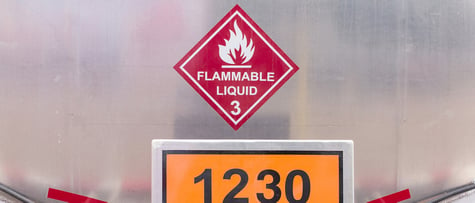When transporting chemical products, careful steps need to be taken to avoid costly, even disastrous, shipping errors. In this article, we’ll examine the “Dos and Don’ts”– or more accurately, the “Don’ts and Dos” – of chemical transportation to help you get your operation on the right track (or in the right tank).
Chemical transportation DOs and DON’Ts
1. DON’T book a load without sharing required details with the carrier
Here’s an all-to-common scenario in the world of chemical shipping: The shipper entrusts load booking to a green employee that doesn’t yet have a high degree of operational knowledge. The directive is simple: “go find the best rate to move this product.”
The problem here is that, without some requisite information, carriers and freight brokers aren’t going to fully understand what your needs are. If they don’t know what your needs are, they can’t determine if they can meet those needs and provide a quote. And, even if a quote was provided based on limited information, it would be much higher than normal because all that uncertainty will be baked into the price.
DO: provide your carrier or broker with as much information as possible. Your chemical transportation provider needs information to ensure that it can move your load safely and efficiently. This information includes project timeline, loading and unloading sites, equipment required, and product details (more on that in a second). The more information you can provide, the better your carrier’s or broker’s ability to quote you accurately. For some examples of the information you’ll need, check out our article on bulk transport equipment.
2. DON’T book a load without understanding your product
 Just like the missing details described above, many shipping reps try to book loads without having adequate product information, which is vital to your transportation partner. This is especially true in the world of bulk shipping, where a bad match between product and equipment can result in substantial damages and/or product losses – not to mention the dangers posed to drivers and the public.
Just like the missing details described above, many shipping reps try to book loads without having adequate product information, which is vital to your transportation partner. This is especially true in the world of bulk shipping, where a bad match between product and equipment can result in substantial damages and/or product losses – not to mention the dangers posed to drivers and the public.
DO: provide your carrier with your product’s Safety Data Sheet (SDS) and other information. At a minimum, you should be able to provide the SDS sheets for your products. This document includes key information related to the chemical being shipped and potential hazards it may pose. Helpful additional information includes data related to incompatible prior products (i.e., what chemicals cannot be in a tank or dry bulk trailer before your product), hazmat placards and tank wash requirements.
3. DON’T hire a carrier without vetting it first
When entrusting a load to a carrier, it is not uncommon for shippers to fast track or even skip the carrier-vetting process in order to get product on the move faster. This can be a costly mistake. For example, if something goes wrong with the shipment and your carrier doesn’t have adequate insurance, you may be on the hook for a lot more than you bargained for.
DO: Thoroughly vet carriers – or turn to a freight broker instead. Vetting a carrier involves acquiring key documentation like insurance information, operating authority, and driver certifications. It also involves managing this information and making sure it’s current. Admittedly, such due diligence is time consuming, especially when you need to vet multiple carriers.
As an alternative, you can partner with a freight broker that has a national carrier network. Brokers like Bulk Connection, for example, perform a thorough vetting process for all their carriers (we have a department dedicated to just that). This process is designed to keep carrier information current, while weeding out providers that fall short. By working with such a freight broker, you effectively sidestep the time and resources needed to vet individual carriers yourself.
4. DON’T get blindsided by supply chain interruptions
Whether caused by bad weather or seasonal shortages, supply chain interruptions can rear their ugly heads from time to time. When such interruptions hit, the common reaction of many shippers is to (a) realize that there’s not enough stock on hand, and (b) scramble to find a carrier that can move product immediately. The problem is that, when highways are closed due to a blizzard, there’s no such thing as “immediately.”
DO: prepare in advance for interruptions by setting aside emergency stock. While some interruptions occur without warning, others – like those caused by severe weather – can be forecasted several days out. Those forecasts should be the impetus to kick your supply chain into high gear and move your product before the bad weather strikes. It’s also an opportunity to build up an emergency stock in case an interruption takes longer than anticipated.
5. DON’T put all your eggs in one (carrier) basket
Some shippers are content to funnel most freight with one carrier they like. There are downsides to this. First, carriers tend to get complacent. And, while they value your business, they might not mind raising your rates from time to time.
Next, there are times when a carrier may experience capacity shortages. If you haven’t built a relationship with other carriers or freight brokers, you’ll essentially need to pause your supply chain while you set up a new account with a new provider. This is wasted time that most shippers can ill afford.
DO: partner with a freight broker to secure capacity and keep rates competitive. You can get your eggs out of the one-carrier basket by simply establishing relationships with other carriers. Or, better yet, you can establish a relationship with hundreds of carriers by partnering with just one freight broker that has a national carrier network. Such a freight broker can not only help you find capacity when it’s scarce, it can also match your loads with carriers that specialize in specific lanes and keep your costs low by shopping your freight among several providers.
If you’d like to learn more about the benefits of working with a freight broker for chemical transportation, contact Bulk Connection today. With over 30 years of experience and one of the largest bulk carrier networks in North America, we have the expertise and capabilities to ensure that your chemical supply chain stays on the right track.





